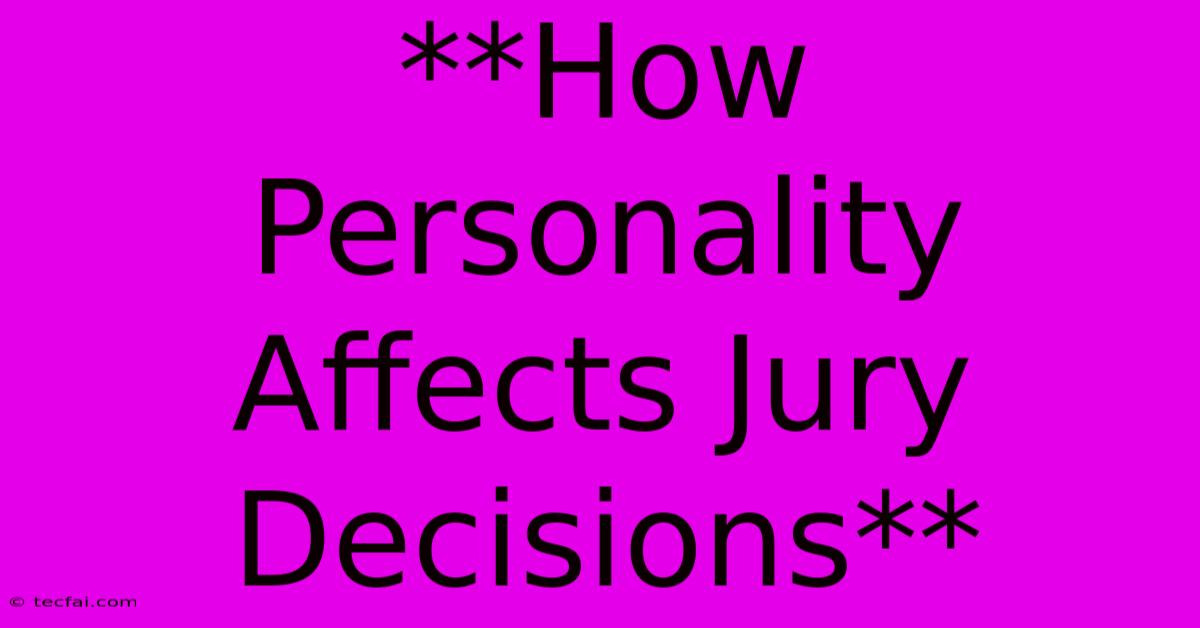**How Personality Affects Jury Decisions**

Discover more detailed and exciting information on our website. Click the link below to start your adventure: Visit Best Website tecfai.com. Don't miss out!
Table of Contents
How Personality Affects Jury Decisions: Unmasking the Human Element in Justice
The American judicial system places immense faith in the jury, a group of ordinary citizens tasked with deciding the fate of individuals accused of crimes. Yet, beneath the veneer of impartiality, a fascinating question arises: how do the personalities of individual jurors impact their decisions? While legal systems strive for objectivity, the human element inevitably creeps in, shaping perceptions, influencing arguments, and ultimately impacting the final verdict.
This article delves into the complex interplay between personality and jury decisions, exploring the subtle but significant ways in which individual traits can sway judgment.
The Influence of the Big Five Personality Traits
Psychologists have long recognized the "Big Five" personality traits: Openness, Conscientiousness, Extraversion, Agreeableness, and Neuroticism. Research suggests these traits can subtly influence how jurors perceive evidence and interact with the legal process:
- Openness: Jurors high in openness tend to be more receptive to new information and perspectives, potentially making them more open to complex arguments and nuanced evidence.
- Conscientiousness: Highly conscientious jurors might be more likely to carefully analyze evidence and adhere to instructions, contributing to a more thorough and meticulous decision-making process.
- Extraversion: Extraverted jurors might be more influenced by social cues, leading them to be swayed by persuasive arguments or the charisma of witnesses.
- Agreeableness: Agreeable jurors might be more prone to sympathize with the defendant, potentially leading to more lenient verdicts.
- Neuroticism: Jurors high in neuroticism might be more easily swayed by emotional arguments or sensationalized evidence, potentially leading to biased judgments.
Beyond the Big Five: Other Personality Factors
The impact of personality goes beyond the Big Five. Several other factors can influence jury decisions:
- Authoritarianism: Authoritarian jurors tend to favor strict law enforcement and punitive measures, potentially leading to harsher sentences.
- Need for Cognition: Individuals with a high need for cognition are more likely to engage in critical thinking and analysis, leading to more deliberate and informed decisions.
- Cognitive Complexity: Jurors with higher cognitive complexity are better at understanding complex arguments and integrating different perspectives, potentially leading to more balanced judgments.
The Challenge of Bias
Understanding the influence of personality on jury decisions presents a significant challenge for the legal system. While individual biases may be subtle, their cumulative effect can significantly impact justice.
- Implicit Bias: Unconscious biases, often rooted in societal stereotypes and personal experiences, can subtly influence jurors' perceptions of defendants, witnesses, and the legal process.
- Groupthink: The tendency for groups to conform to a prevailing opinion can lead to a lack of critical thinking and potentially biased decisions.
Implications for Legal Practice
Recognizing the impact of personality on jury decisions has significant implications for legal professionals:
- Jury Selection: Attorneys can utilize personality assessments and other psychological tools to carefully select jurors who are likely to be fair and impartial.
- Trial Strategy: Understanding the personality traits of jurors can inform trial strategies, allowing lawyers to tailor their arguments and presentations to resonate with the specific audience.
- Legal Reform: Efforts to promote diversity in juries can help to mitigate the impact of individual biases by ensuring a wider range of perspectives and experiences are represented.
Conclusion: Embracing the Human Factor
The influence of personality on jury decisions underscores the inherent complexity of the legal system. While ensuring fairness and impartiality remains paramount, recognizing the human element is crucial. By acknowledging the impact of individual traits and biases, the legal system can strive to create a more just and equitable society, where decisions are based on facts, evidence, and a deeper understanding of the human condition.

Thank you for visiting our website wich cover about **How Personality Affects Jury Decisions** . We hope the information provided has been useful to you. Feel free to contact us if you have any questions or need further assistance. See you next time and dont miss to bookmark.
Featured Posts
-
Sing Tel Breached Chinese Hackers Target Telecoms
Nov 06, 2024
-
Lidl Christmas Ad Britons Find Holiday Spirit
Nov 06, 2024
-
Chris Hoy Diagnosis Spurs Prostate Cancer Review
Nov 06, 2024
-
10 Counties To Watch In Tuesdays Election
Nov 06, 2024
-
Photos Heilungs Mystical Show In Adelaide
Nov 06, 2024
